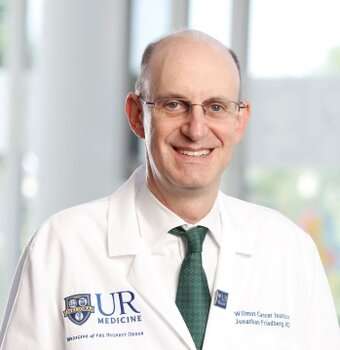Thanks to clinical trials, big leaps made in lymphoma treatment

Newer therapies are outpacing the current treatment for diffuse large B cell lymphoma, according to data that scientists will deliver from two major clinical trials at the American Society of Hematology (ASH) annual meeting Dec. 11–14.
Wilmot Cancer Institute Director Jonathan Friedberg, M.D., M.M.Sc., a co-author for one of the studies, said he believes the results will change the standard of care for these patients, pending full review of the manuscripts and U.S. Food and Drug Administration approval.
"It is notable that Wilmot participated in both of these trials, meaning that our patients had access to these therapies years before they are becoming a standard treatment," Friedberg said. "It also emphasizes the importance of clinical trials, and demonstrates the impact of our recent, significant investment in clinical trial infrastructure."
The first study involved 879 individuals with newly diagnosed diffuse large B cell lymphoma, the most common type of lymphoma. For the past 20 years, these patients have been receiving a regimen known as R-CHOP—but only about two-thirds are typically cured. Many clinical trials over the years have evaluated ways to improve R-CHOP, with negative results, Friedberg said.
In this study, however, scientists tested a different drug cocktail that substituted a targeted therapy, polatuzumab, for vincristine in the RCHOP regimen.
Half of the study patients received the new drug combination. Data show they had a 27-percent reduction in the relative risk of the lymphoma progressing, relapsing, or death, compared to R-CHOP. Importantly, Friedberg said, the new regimen's safety profile was similar to R-CHOP and the trial was conducted by gold standards (double-blind, placebo-controlled).
A second B-cell lymphoma study, highlighted at ASH's plenary session, showed the benefits of state-of-the-art CAR T-cell immunotherapy, which has been available for eligible lymphoma patients at Wilmot for five years.
CAR T-cell therapy is one of the most exciting cancer treatments to emerge in recent years, harnessing a person's immune system to fight cancer.
Data from the latest trial show that for patients with relapsed large B-cell lymphoma, CAR T-cell treatment instead of chemotherapy and an autologous stem-cell transplant was more effective in high-risk patients.
The type of CAR T-cell therapy evaluated in the clinical trial is called Axi-cel. The FDA has approved Axi-cel for diffuse large B-cell lymphoma but only after two or more lines of treatment have been used; this trial addressed Axi-cel's effectiveness at an earlier point in a patient's treatment course.
In 2016, Wilmot was among the first cancer centers in the nation chosen to evaluate CAR T-cell therapy in B-cell lymphoma patients, and now "Wilmot is the only center certified to administer CAR-T therapy in the region," Friedberg said.


















